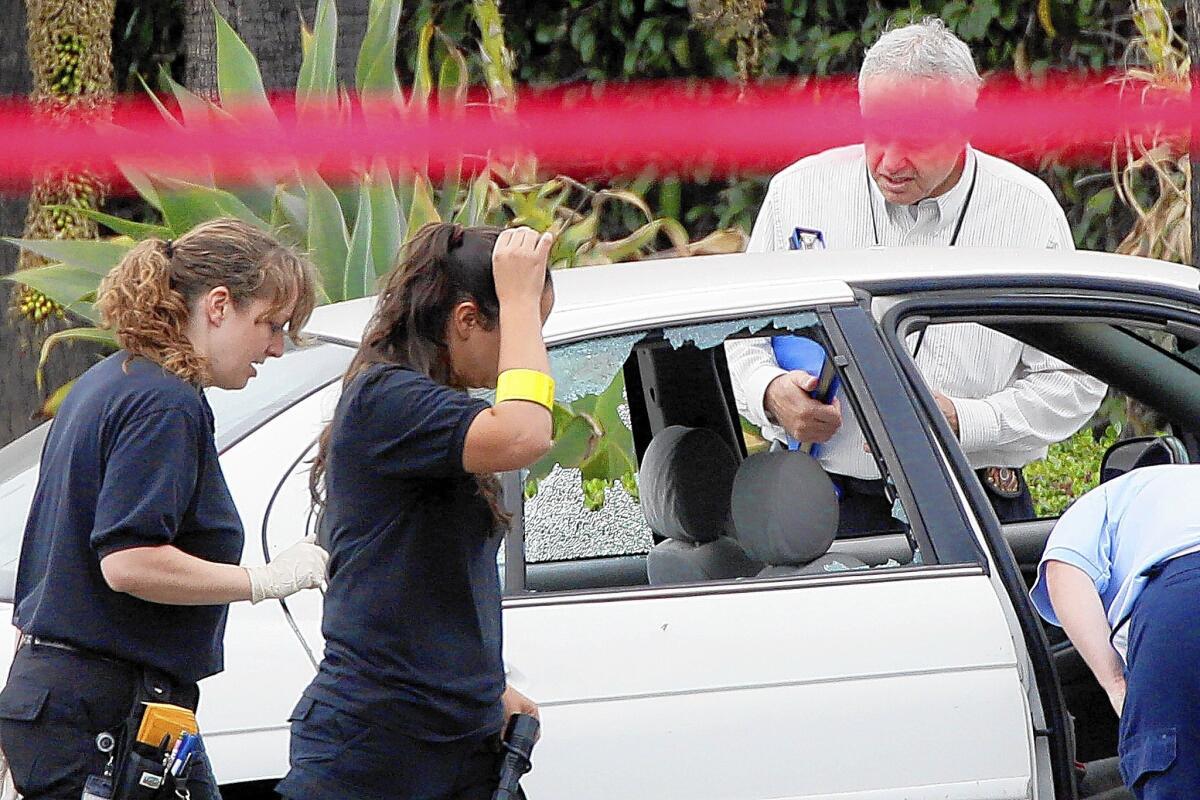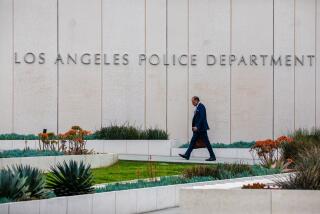Report raises doubts about ambush of 2 LAPD officers

The attack on the police officers was as perplexing as it was brazen.
Before dawn one morning last June, a Los Angeles police detective and his partner were returning to their station on Venice Boulevard. As they waited for a security gate to slide open, a man approached their car, acting suspiciously.
Det. Humberto Tovar and Officer Bernard Romero gave investigators harrowing accounts of the gun battle that erupted moments later. Tovar recalled how the man had walked to the back of the car and fired through a back window. The detective described seeing the flash of the gun’s muzzle and hearing the sound of shattering glass as he prepared to return fire. Tovar and Romero detailed how they had traded shots with the man as he retreated across the wide street and then disappeared into the darkness.
A massive manhunt, involving SWAT teams, K9 units, and hundreds of other officers, brought a swath of the mid-city area to a halt. Los Angeles Police Department Chief Charlie Beck reported to a shocked public that the officers had been lucky to escape with only minor injuries.
The ambush, Beck said, had been “a blatant attempt to assassinate two of the people who protect this community.”
Now, however, a report by LAPD Inspector General Alex Bustamante has concluded the attack may have never occurred.
“A thorough examination of the officers’ vehicle and the surrounding area,” the report found, “revealed there were no impacts or other physical evidence to support that the Subject fired a weapon.”
Tovar could not be reached and Romero declined to comment, but LAPD officials stood by the officers’ claim that they were attacked. In a statement, Cmdr. Andrew Smith, a spokesman for Beck, said, “the actions of the suspect, the witnesses’ statements and the officers’ observations support the officers’ belief that they were being fired upon.”
Tovar’s history in the department added another level of intrigue to the case. He was fired in 2000 after his former partner, corrupt ex-officer Rafael Perez, accused Tovar of being complicit in a plan to plant drugs on a suspect. A judge later reinstated Tovar, finding that the firing had been improper.
Tovar was also accused of misconduct in a shooting. A corrupt officer told federal authorities of a conversation he had with Perez, who was the central figure in the department’s Rampart scandal. Perez allegedly recounted a time when he had fired his gun. Tovar then allegedly fired his gun as well, not because he was in danger, but in an effort to make Perez’s actions appear more justified, court records show.
The findings in Bustamante’s report parallel those from another high-profile LAPD shooting last year. In that incident, a team of LAPD officers opened fire on a pickup truck, believing it was driven by Christopher Dorner, the former cop who had vowed to kill LAPD officers he blamed for his firing. The officers reported seeing and hearing gunfire from the truck, despite the fact it was driven by two unarmed women.
In that case, the Police Commission, which oversees the LAPD and rules on officer shootings, found the officers’ use of deadly force was unjustified. But in a 3-1 vote, the board approved of the decision by Tovar and Romero to open fire on the man, finding that his actions had been threatening enough to reasonably put the pair in fear for their lives.
The incident began shortly after 4:30 a.m. on June 25, as Romero and Tovar, members of a surveillance unit, returned to the department’s Wilshire Division station, according to the LAPD’s press statement about the incident and Bustamante’s nine-page report. The report was based largely on facts gathered by the LAPD’s internal investigation into the shooting.
As Romero pulled up to the gate at the station parking lot, he and Tovar saw the man approaching the car on the sidewalk. According to Bustamante’s report, Tovar, a 19-year veteran of the department, told investigators he thought “the man’s actions seemed odd and that he appeared to be ‘amped up.’” Tovar recalled telling Romero to “watch out” as the man came closer.
Then, Tovar said, the man made “a two-hand motion as if he was assuming a shooting stance.” Tovar said he unholstered his gun as the man walked behind the car.
Tovar “believed he saw a muzzle flash, heard glass breaking and believed that the Subject was shooting at them,” the report found. The detective “turned to his right and fired over his right shoulder, out the right rear window.”
That was the start of a barrage of gun fire from Tovar, who got out of the car to continue to shoot at the man as he retreated across the wide boulevard. Tovar told investigators he believed the man was firing rounds at him, saying he saw more muzzle flashes and heard bullets “popping” around him.
In all, Tovar fired 23 times, investigators found. It is unknown if the suspect, who was never identified, was hit.
Footage from security cameras at a business across the street failed to clearly capture the initial encounter, but recorded some of the aftermath. The images showed the man stopping in the street median to turn back toward the officers and raise his arm in their direction, the report said. A witness gave a similar statement, according to the report.
Romero, meanwhile, was found to have unintentionally fired four times into the police car’s roof and elsewhere inside the vehicle when the shooting began. He then fired several more rounds over his shoulder in what he believed was the man’s direction.
As they poured over the crime scene, however, members of the department’s Force Investigation Division, which conducts in-depth investigations of each officer shooting, could find no conclusive proof the officers had come under attack. The only bullets and spent shell casings recovered were those belonging to the officers. And a careful examination of the car and surrounding area showed no signs of gunfire from the man. LAPD investigators were unable to link the police vehicle’s shattered windows to the suspect.
From the video footage, it was unclear whether the man was firing a weapon. It showed him holding an “elongated” object in his hand as he walked away, but investigators could not identify it.
More to Read
Sign up for Essential California
The most important California stories and recommendations in your inbox every morning.
You may occasionally receive promotional content from the Los Angeles Times.











